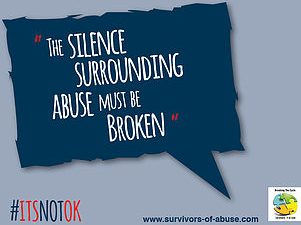
As I’m writing this, we’re wrapping up Sexual Abuse and Sexual Violence Awareness Week. As a mental health professional and trauma counsellor, I know many of my colleagues are actively addressing and attending events to communicate #ItsNotOk throughout London and worldwide.
What an incredible way for us to come together as helping professionals by standing with survivors! The shadow side of this type of week, and the impending Valentine’s Day festivities, is the potential for triggers for even the most self-aware of first responders and other helpers. Our clients are disclosing sexual abuse and we’re helping them process these complex issues for themselves. Statistically, a significant number of adults have experienced sexual abuse and sexual violence, whether recently or in childhood.
Unfortunately, just because you’re a first responder or other helping professional, it does not make you immune to the lifelong struggles you might be very skilled at helping others through.
You’ve Healed From the Trauma, but There’s Still Work to Do
You have a good job. Work that makes a difference to the people you serve. Lots of great friends. Maybe you even have “everything going for you”. Yet, you’re not entirely happy and fulfilled because of past trauma. It’s like something in your past is still holding you back. When it comes to relationships, you may feel like you’re behind everyone else. Like you haven’t got it quite figured out yet.
Maybe that event in your past was a sexual trauma of some sort. You’re in a relationship now and you feel like it’s time to talk to your partner. You want to share your story. However, you don’t even know how to go about disclosing sexual abuse to a new partner or friend. How do you bring up this topic and explain what happened?
Just thinking about the sexual abuse you went through in the past makes you feel ashamed and even angry. You’ve found it difficult to trust, open up and fully connect when you are interested in someone or beginning a new relationship. Perhaps you actually find yourself wearing your heart on your sleeve, attaching too quickly, and getting hurt again.
PTSD is Nothing to Be Ashamed About
There are many different ways you may have experienced sexual trauma. Perhaps, it was a single incident of having your personal boundaries violated (e.g. sexual harassment from a boss or colleague at work, from a stranger in a public place). Maybe the violence was sudden and shocking (e.g. rape or sexual assault by an acquaintance, date, stranger or friend). Finally, you may have endured a prolonged period of sexual abuse (e.g. from a family member or neighbour – long ago or even recently, from a trusted long-term partner).
No matter how sexual violence happens, it can leave emotional scars that run deep. It’s expected to come away from sexual abuse with a few scars. In fact, PTSD symptoms begin as a normal response to trauma. However, sometimes that trauma seems to get stuck. This isn’t something to be ashamed of, but it can be an important thing for your partner to know as your relationship progresses.
Now, You’re Curious About Disclosing the Sexual Abuse
You quietly wonder how to truly put it out of your mind and leave it in the past. But, the way you feel and how you behave in new relationships alerts you that it’s going to be more challenging. You care about this relationship and don’t want your past abuse to cause relationship problems.
It’s not easy to separate who you are now from the PTSD symptoms you are still feeling. Would it be easier if your partner knew what happened? Could that help build trust and understanding as you become more intimate? Maybe your partner could be more sympathetic when you feel jumpy when they don’t call you back immediately. Perhaps sex will be more pleasurable for you both if they could fully understand.
Sexual violence is part of your story, but it’s not your whole story.
Maybe you’ve just entered into a new relationship and you’re head over heels with someone you’re beginning to trust. Or, you’ve been in a steady relationship and you’re ready for a more serious commitment. Something inside may be calling you to disclose sexual abuse from your past. But, a part of you is worried about being rejected and not believed. Or, that they will feel disgusted towards you. Maybe you are worried your partner will hold contempt towards the person who hurt you, and who may still be a part of your life today.
“I am not ashamed, I am brave.” ~Charlotte, Survivor Stories
To be clear, you don’t have to tell anyone. You can make the choice to disclose how you want when you want. As a first responder or professional helper, you might feel like you have to protect others from the pain of your story. Doesn’t that feel strange? I know. But, it’s in our nature as helpers. We want to protect, even when we’re hurting.
You deserve love, happiness, and support too.

Of course, you want someone in your life with whom you can share your vulnerabilities without getting hurt. A person with whom you can be your true self, be unafraid and free to show all parts of yourself. You don’t want to feel like you’re hiding any secrets from the love of your life. Trauma can unfairly make you feel mistrustful, suspicious, jealous, needy, fearful and all sorts of other emotions that may cause you to react negatively. These normal, human reactions can cause us to put blocks in new and healthy relationships that have the potential to flourish.
You want to feel fully supported by your partner, to know that they won’t judge you for your past, to know that they won’t hurt you like you’ve been hurt by others before. This is a completely reasonable desire!
How will you know you’re ready to disclose sexual abuse?
There are many things to consider, and important to remember that you cannot predict the outcome or reaction of your partner. Before disclosing, it’s important to give some time and careful thinking about:
- why you want to share
- how you’d like to share
- what words to use
- how much to share
- what would make you feel safe during your sharing and afterward
Of course, it may not always go the way you intend. No matter how the conversation happens, please don’t feel you have to over-share or give lots of details. If you’re not comfortable, it is okay to stop the conversation, ask for space, and revisit again when you feel more fully ready.
When you’re sharing, take notice of what’s happening and check-in with how you’re feeling. Do you feel that your partner is listening and giving you space? Are you believed in and supported unconditionally? Do you feel your trust for each other growing? Whist not guaranteed, these are the types of responses and reactions one would hope from a loving partner.

Your Choice to Disclose Sexual Abuse to a Partner is a Gift
Remember, how and when you choose to tell someone else is yours. What you can’t control is their reaction. Their response is about them, not you. While I hope that anyone you choose to gift with your story would respond with the utmost care, I know that may not always happen. So, it’s important to have a support plan in place. For partners who just need help understanding, or for a safe place to process the disclosure shared with them, we could explore this further in individual relationship therapy. If you need to process more with someone who understands the unique pressures of being a first responder, we can work together in trauma therapy.
After sharing your story with a partner, you may want to have a phone date with a friend. A walk in the park. Or, a quiet time to rest and reflect in a journal. Of course, you can always call the Samaritans at 116 123. For help specifically related to sexual violence and sexual abuse, The Survivors Trust has an excellent list of resources to use. Finally, I would love to help you process the trauma in a new way, perhaps working creatively through dramatherapy. If you’re interested in talking with me more about this, let’s connect.
Begin Therapy for First Responders and Helping Professionals in London
First responders and helping professionals need someone who understands. Someone who is able to both help and support from a place of empathy. That’s where I come in. One of my specialties is dramatherapy for first responders. You may be doubting your role. Or, wondering how you fit into the bigger picture when bad things keep happening in our world. Perhaps, you recognise the way your job is affecting your family. Maybe you just don’t think therapy can work for you. Whatever your reasons for reading this are, if you’re a first responder, I can help you.
You do not have to manage vicarious trauma and triggers all on your own.
When you are ready to take control of your life, I am ready to help you. You deserve healing from your PTSD symptoms, hope about the future and to have healthy relationships moving forward. I am a trauma counsellor with therapy offices in Angel or Farringdon. I would love to help you find healing through trauma counselling. If you are ready to let go of your stress, manage y our stress and feel more connected with your loved ones, I can help.
Let’s get started with a free 20-minute therapy consultation over the phone. I look forward to speaking with you very soon!
________________________________________
If you have any requests for a blog post, please feel free to send your questions, comments or ideas to: jamie@ytherapy.com
Please note that this blog is meant to be educational and should not be a substitute for therapy.
If you would like to enquire about trauma therapy, please contact me or book an appointment: https://ytherapy.com/book-an-appointment/

